7th Annual People & Pets – Feathered Friends
BY Ryan Davis
Here’s a number you weren’t expecting … According to the Avian Welfare Coalition’s Web site there are (possibly) 60 million captive birds living in the United States. If you’re doing the math that means multiple millions of bird owners. Sadly many of these bird owners are uneducated about the proper care and treatment of exotic birds and so are doing more harm than good. We’re happy to report that in our corner of the coast the Wilmington Bird Club still a hatchling itself is making great strides rescuing nourishing and just generally caring for exotic birds of all feathers. The very first Wilmington Bird Club meeting drew a passionate crowd of nearly 40 local bird enthusiasts. Since that meeting in April 2009 club members have been working diligently to establish safe havens for displaced birds and educate those thinking of becoming bird owners. Club president Nina Roshon-Rabozzi says “We hope to continue to grow for the sake of exotic bird awareness.” Ownership however can not be taken lightly. “It takes a certain level of dedication to keep birds ” say Dawn and Sam Willman committed bird lovers and club members. “Too often people buy exotic birds on a whim without considering the facts first.” As volunteers at various zoos and animal shelters the Willmans have seen bird abuse first-hand. “People don’t realize that most birds have a lifespan longer than humans ” says Sam “so within only a few years of ownership they realize it’s too much work and either set them lose into the wild or surrender them to shelters.” Because of the necessary long (in terms of years) and deep (in terms of emotional) commitment it’s important to do your research first before you actually buy or take in an exotic bird. Wilmington Bird Club member Alison McCollum did many hours of research before deciding what type of bird to purchase. “You have to know what bird fits your own personality understand their diets and needs and so much more ” McCollum says. “That’s why research is so important. Hopefully it’ll prevent a bird from being abandoned in the future.” For our seventh annual People and Their Pets feature story five of the club’s members (and their beautiful birds) welcome us into their homes.
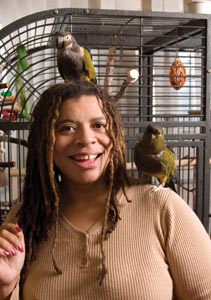
Marie Young
Marie Young remembers a run-in with a Cockatoo she once owned. “I had to have eight stitches in each hand; that just goes to show it’s not always easy but ” she adds emphatically “it’s always worth it.” Young attributes her slow start to the fact that birds need to form bonds with their owners and have fixed environments. Young’s Cockatoo had been passed around too many times and was hesitant to let Young get too close to her.
“I don’t like to see birds bounced around ” says Young “so I really tried to help this Cockatoo but I had to eventually find it a new home.” Young now jokes that since the Cockatoo was “re-homed ” it came to love its new owner. That just goes to show that each bird’s personality meshes differently with different types of people. “I’m just glad he found a home ” says Young who now owns two Patagonian Conures Cookie and BooBoo and Sydney a Cockatiel.
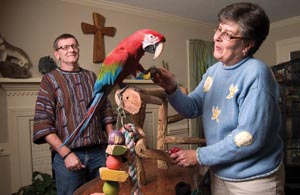
Nina Roshon-Rabozzi and Robert Rabozzi
with Sadie Greenwing Macaw
The heart of the Wilmington Bird Club is the home of Robert Rabozzi and Nina Roshon-Rabozzi. Nina and Robert have rescued and successfully placed more birds than they can remember. Now a retired veterinarian Nina relocated to Wilmington to work in a local animal hospital in 1992 so her tie to animals is more than just a hobby. She has a special place in her heart for helping animals especially birds because she says “There is a hole in animal rescue for birds and unfortunately not many people are making an effort to recognize that birds need help too.”
That’s why Nina took over as president of the Wilmington Bird Club after club founder Ces Erdman had to relocate. Since her professional retirement in May Nina has fully committed herself to caring for her birds to rehabilitating second-hand birds and to helping the Wilmington Bird Club become more active in the community.
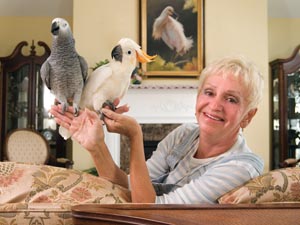
Dawn Willman
Bird owners for more than 20 years Dawn and her husband Sam Willman remember that their first parrot an African Grey named Baby (who is still alive today) was purchased as an educational and entertainment “tool” for the day care center Dawn once owned. “The children loved Baby ” says Dawn. “Birds are so mesmerizing to children; their positive reaction to birds is amazing.”
The same can be said for the Willmans. In addition to owning Baby they now have a Citron Cockatoo named Dolly. Baby is 21 years old and Dolly is 18. “In bird years neither one is even middle-aged ” says Sam. “If you’re planning on buying a bird prepare to be in it for the long run.”
The emotional commitment is obvious when it comes to Dawn and Sam. But it’s easy to tell that the birds really like them too. When Sam leaves the room Baby cries for him until he returns “and if I’d let her ” says Sam “Baby would perch on my shoulder the entire day.”
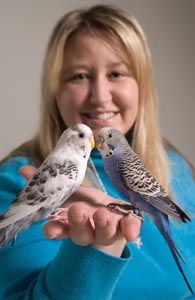
Alison McCollum
In September 2007 Alison McCollum became a new bird owner deciding after much research that her first bird would be a Budgie Parakeet. She named the bird Bongo.
Since she welcomed Bongo into her life McCollum has opened her home to three more rescued birds — two more parakeets (another Budgie named Bijou and a Mustached Parakeet named Binx) as well as a Peach-fronted Conure named Groucho.
Once she got Bongo McCollum realized how much she enjoyed being able to help these underappreciated birds. “It just seemed natural to take in a second-hand bird ” she says. “I was even able to give one of them away to a woman who is now an active member of the club.”
McCollum says it’s great that the birds she’s fostered in the past have been re-homed to people who will truly care about the well-being of their pets. “What you have to understand is that it’s more than owning a bird ” McCollum says. “It’s a relationship.”
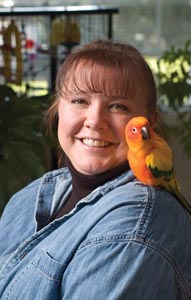
Donna Hayes
Donna Hayes thanks her boyfriend for getting her interested in birds. He had owned them in years past and introduced her to the idea of keeping a bird around. His encouragement worked and ever since she received her first bird a Sun Conure Hayes says “I never thought I’d be this much of an advocate for birds.” Now she’s not only an advocate for exotic bird awareness she also helps rescue homeless birds and even breeds Green-cheeked Conures which she decided to breed because “they’re good starter birds.” While many club members think Parakeets are good for beginners Hayes thinks new owners can be just as successful in caring for the right type of Conure. “Green-cheeks have a great temperament if you have children ” Hayes says. “They tend to make less noise than other parrot types and are easier to handle and eventually play with.”
The Wilmington NC Bird Club
The Wilmington NC Bird Club meets every month and is dedicated to the education of our members and our community on the care of companion birds. For more visit www.wilmingtonncbirdclub.com.